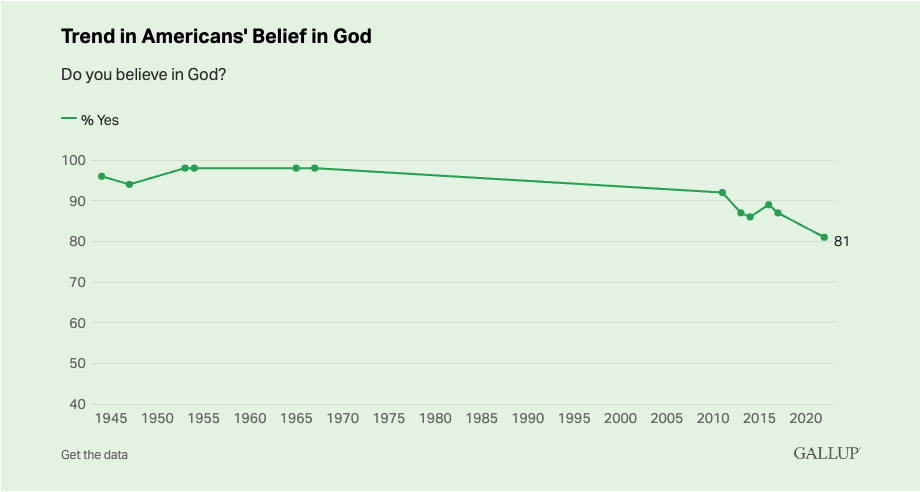Seeing God Clearly, Morality's Defining Characteristic, Falling in Love With Getting Better
The Disciple-Leader Newsletter #42 // November 11, 2023
Discipleship. Leadership. Mental Performance.
DISCIPLESHIP
"No man ... that clearly seeth the beauty of God's face ... can when he sees it clearly, willingly, and wittingly forsake it."
Thomas Traherne
In 2022, Gallup reported that only 81% of Americans believe in God, the lowest number ever reported. "Between 1944 and 2011, more than 90% of Americans believed in God."
When thinking about this trend of disbelief, it's interesting to consider this verse from The Book of Mormon: "Yea, every knee shall bow, and every tongue confess before him. Yea, even at the last day, when all men shall stand to be judged of him, then shall they confess that he is God" (Mosiah 27:31).
For that to happen—for someone to go from disbelieving in God entirely to not only admitting that there is a God, but doing so while bowing before Him—a dramatic change would be necessary. So what changed? They came to see God clearly.
"Wherefore, we shall have a perfect knowledge of all our guilt, and our uncleanness, and our nakedness; and the righteous shall have a perfect knowledge of their enjoyment, and their righteousness, being clothed with purity, yea even with the robe of righteousness" (2 Nephi 9:14). Implied here is that we'll have a knowledge—not just belief—that God is God. We'll see Him clearly. In the face of that reality, our life's actions will cause us to feel either guilty or happy.
There's a difference between merely believing in God and seeing Him clearly. If belief and clarity were synonymous, there wouldn't be over 45,000 Christian denominations alone. Traherne mentions that those who see God clearly never willingly and wittingly forsake Him. But believers forsake Him all the time. The word forsake here has multiple meanings: Forgetfulness, rebellion, and placing Him low on the priority list. Those who see God clearly won't do that.
Somebody who sees God clearly is somebody who has experienced His atoning power. It's somebody who is being transformed by Christ. Theologian Terryl Givens wrote, "We may hold the truth but hold it with insufficient understanding, appreciation, or intimacy; we may give it our assent without giving it our hearts; or we may know the correct facts about Christ and His restoration without having experienced the Christ and His gospel. When Adam and Eve 'knew' each other, they experienced each other in the most complete, total, immersive intimacy of which humans are capable. When the angel asked Nephi if he 'knew' the condescension of God, he was clearly referring to more than an intellectual apprehension. He wanted to know if Nephi had been remade by the experience of Christ's absolute compassion, the stunning realization of Christ's shared suffering in our pain. Had he lived through what Alma referred to as a 'mighty change' that impels one to 'sing the song of redeeming love'?"
Those who are experiencing what Givens describes here can not willingly and wittingly forsake Him. So there's the litmus test. Do you forsake Him? Do you give God the short end of your time? Do you have "living discussions" with Him when you pray? Do you do all you do in His name? Are your thoughts centered in Him? Are the affections of your heart placed on Him?
If not, it's not because you don't believe. It's not because you don't love Him. It's because you don't quite see Him clearly.
Just these two prophetic statements (below) highlight how we don't really see Him clearly yet.
“When you … see our Father, you will see a being with whom you have long been acquainted, and he will receive you into his arms, and you will be ready to fall into his embrace and kiss him.” - Brigham Young
“Our Heavenly Father is more liberal in His views, and boundless in His mercies and blessings than we are ready to believe or receive." - Joseph Smith
The nearer you draw to Him, the clearer you see Him. The more you experience His atoning power, the clearer you see Him. The more precise you live your covenants, the clearer you see Him. You come to not just know about Him, you come to know Him. He becomes familiar. You understand that He only does that which is good for you, thus, you never willingly or wittingly forsake Him.
One day, all will confess that Jesus is the Christ. For those who don't currently confess, there is one thing that is more persuasive than any verbal argument or explanation ever could be. There is one thing that has more convincing power than anything else.
Givens explains: "It is in the face of this reality–a lived transformation one can see at work in the life of His disciples–that the gospel of Jesus Christ finds its irrefutable witness. In the face of these lived, experienced, discernable truths, 'all the doctrines' of the doubters 'fall to ruin'. The rationality of faith is nowhere more evident than its lived efficacy."
Familiarize yourself with God. Come to know Him. Let Him change you. And be this person for others.
LEADERSHIP
“Human beings need recognition as much as they need food and water. No crueler punishment can be devised than to not see someone, to render them unimportant or invisible. 'The worst sin towards our fellow creatures is not to hate them,' George Bernard Shaw wrote, 'but to be indifferent to them; that's the essence of inhumanity.' To do that is to say: You don't matter. You don't exist.”
David Brooks
Here's more from David Brooks on leadership.
"(Iris Murdoch) argues that morality is not mostly about abstract universal principles, or even about making big moral decisions during climactic moments: Do I report fraud when I see it at work? Morality is mostly about how you pay attention to others. Moral behavior happens continuously throughout the day, even during the seemingly uneventful and everyday moments.
"For Murdoch, the essential immoral act is the inability to see other people correctly. Human beings, she finds, are self-centered beings, anxiety-ridden and resentful. We are constantly representing people to ourselves in self-serving ways, in ways that gratify our egos and serve our ends. We stereotype and condescend, ignore and dehumanize. And because we don't see people accurately, we treat them wrongly. Evil happens when people are unseeing, when they don't recognize the personhood in other human beings.
"By contrast, the essential moral act for Murdoch is being able to cast a 'just and loving attention' on another person. 'Love is knowledge of the individual,' she writes. That doesn't mean you have to romantically swoon for everybody you meet. It means that a good person tries to look at everyone with a patient and discerning regard, tries to resist self-centeredness, and overcome prejudice, in order to see another person more deeply and with greater discernment. The good person tries to cast a selfless attention and to see what the other person sees. This kind of attention leads to the greatness of small acts: welcoming a newcomer to your workplace, detecting anxiety in somebody's voice and asking what's wrong, knowing how to host a party so that everyone feels included. Most of the time, morality is about the skill of being considerate toward others in the complex situations of life."
MENTAL PERFORMANCE
"You just want to be the hardest working guy no matter what you do in life. We are all talented in some way, shape, or form and have a passion. Once you find out what that is exhaust all efforts to better yourself every day.”
Steph Curry
Ed Sheeran became one of the world's greatest musicians by sticking to a couple of rock-solid principles. Here are his standards, in his words.
"I always knew that you just had to work harder than everyone else ... I looked at my peers and was like, 'Well, you're playing 1 show a week. I'm going to play 3 shows a night."
"Choose someone that you admire and work harder than them.”
Don't let the simplicity of these statements mask their value. This is life-changing advice from Ed.
Who do you admire, look up to, and want to be like? If you want to be as good as Ed Sheeran, you have to work like Ed Sheeran. If you want to be as good as Steph Curry, you have to work like Steph Curry.
There are a handful of writers who I admire and hope to be as good as. I know I will become as good at writing as they are if I work as hard as them. If I don't, I'll never be as good. If you have a passion and a talent for something, it's simple math. You put in the work, you get the result. It takes what it takes.
This is how Steph Curry's personal trainer, Brandon Payne, describes him: "There is nobody that craves improvement and relentlessly goes after it the way that he does. ... It’s not like he’s in love with this grinding, hard and ridiculous process. He’s in love with getting better. He just has to put up with the process to get there.”
Roger Federer, in talking to the Warriors, emphasized how much he loves his daily ritual. Steve Kerr drew comparisons to Roger and Steph, describing Steph's work ethic as a "metronome" and "clockwork". It's daily. It's consistent.
“He enjoys it so much and he loves the process. That’s one of the things that ties all great athletes together. There’s a routine that not only is super-disciplined, but it’s really enjoyed each day. There’s a passion that comes with it, and that’s what sustains it over time. When you love something like those guys do, you work at it, you get better and you just keep going.” - Steve Kerr (Warriors Head Coach)
Action Steps
Determine what you love and what you're passionate about.
Choose someone that you admire and commit to work harder than them.
Create a daily ritual to master your craft.
Learn to find joy in the disciplined process.
Disciple-Leadership: Jesus-led. Lead like Jesus.







